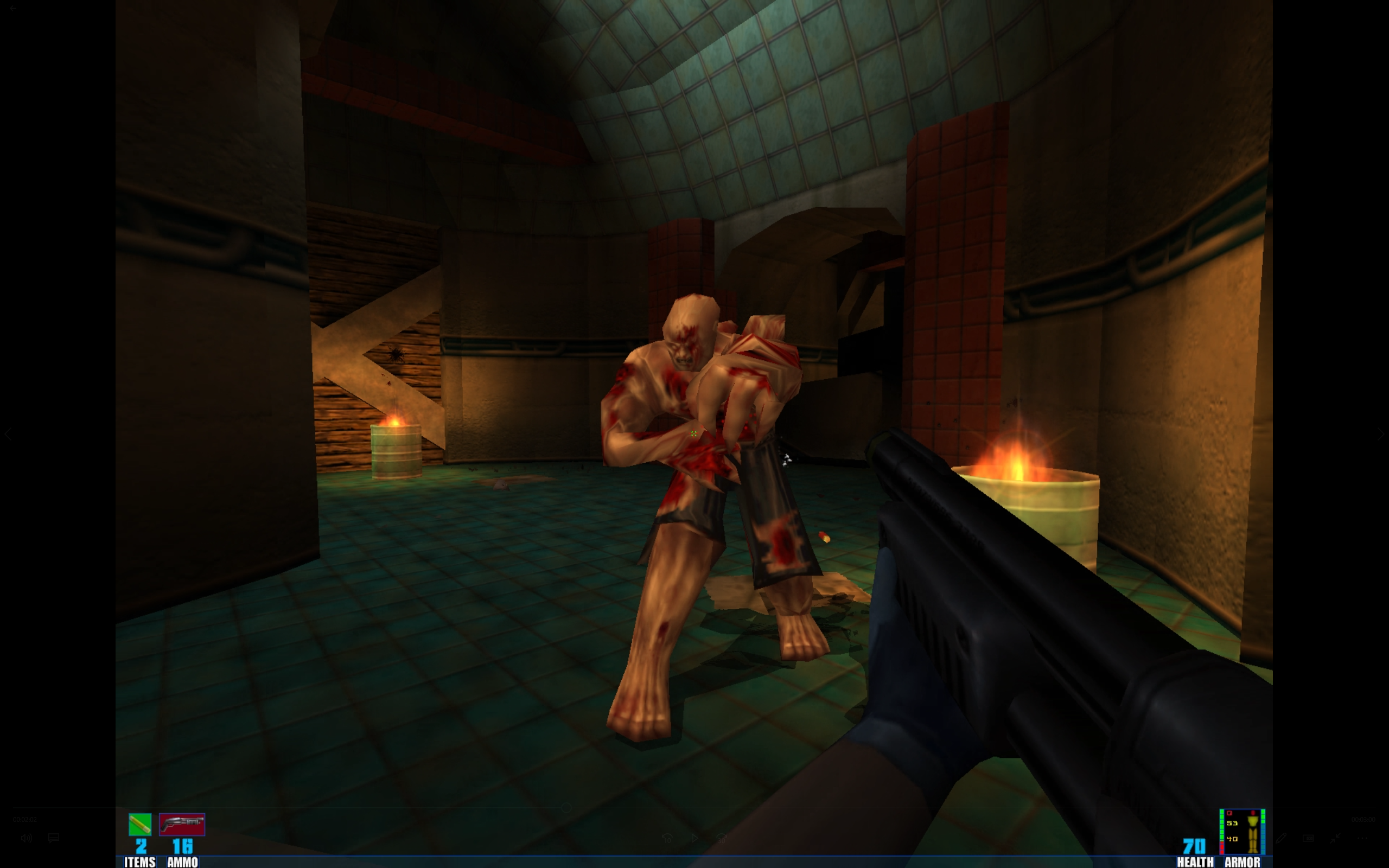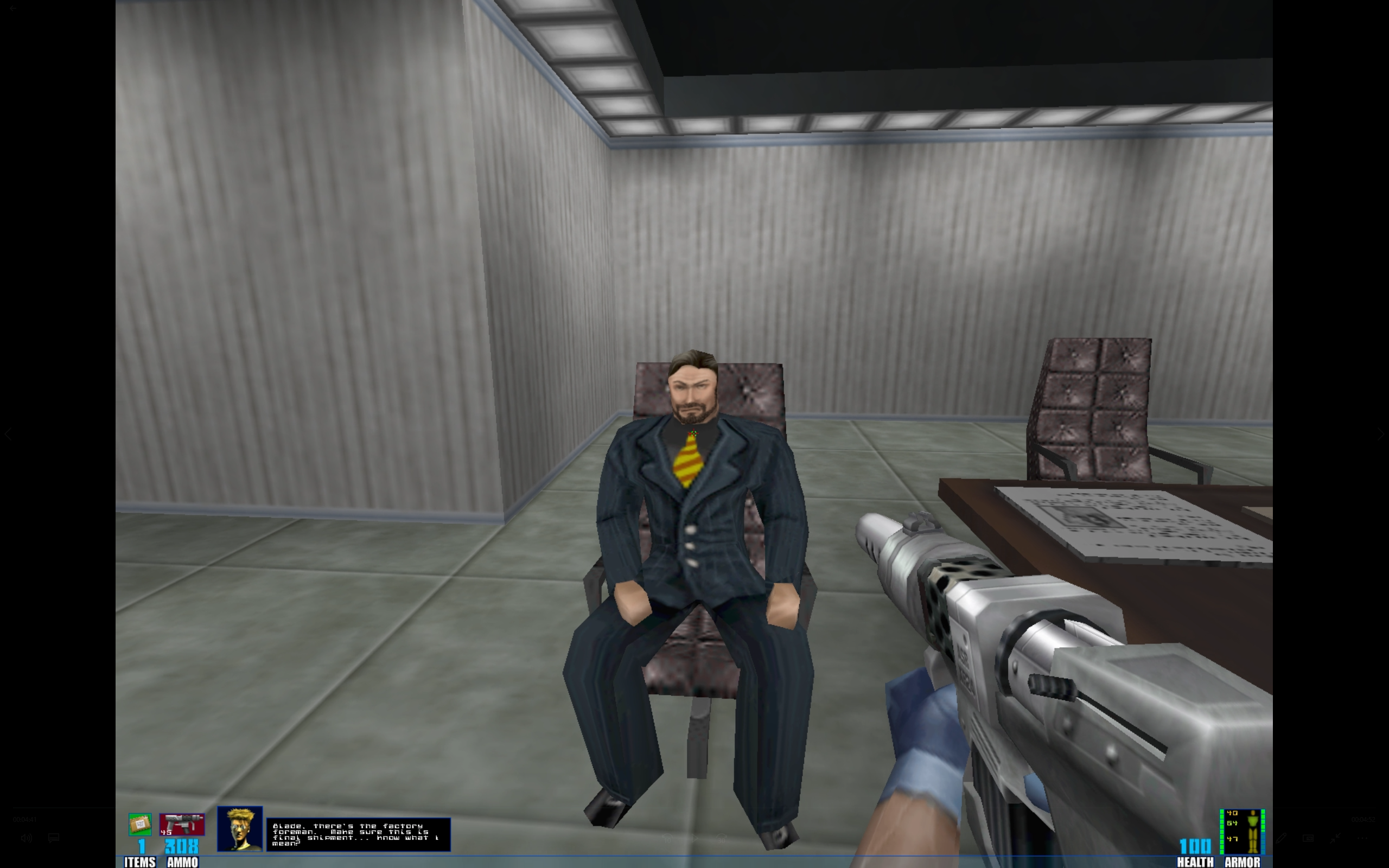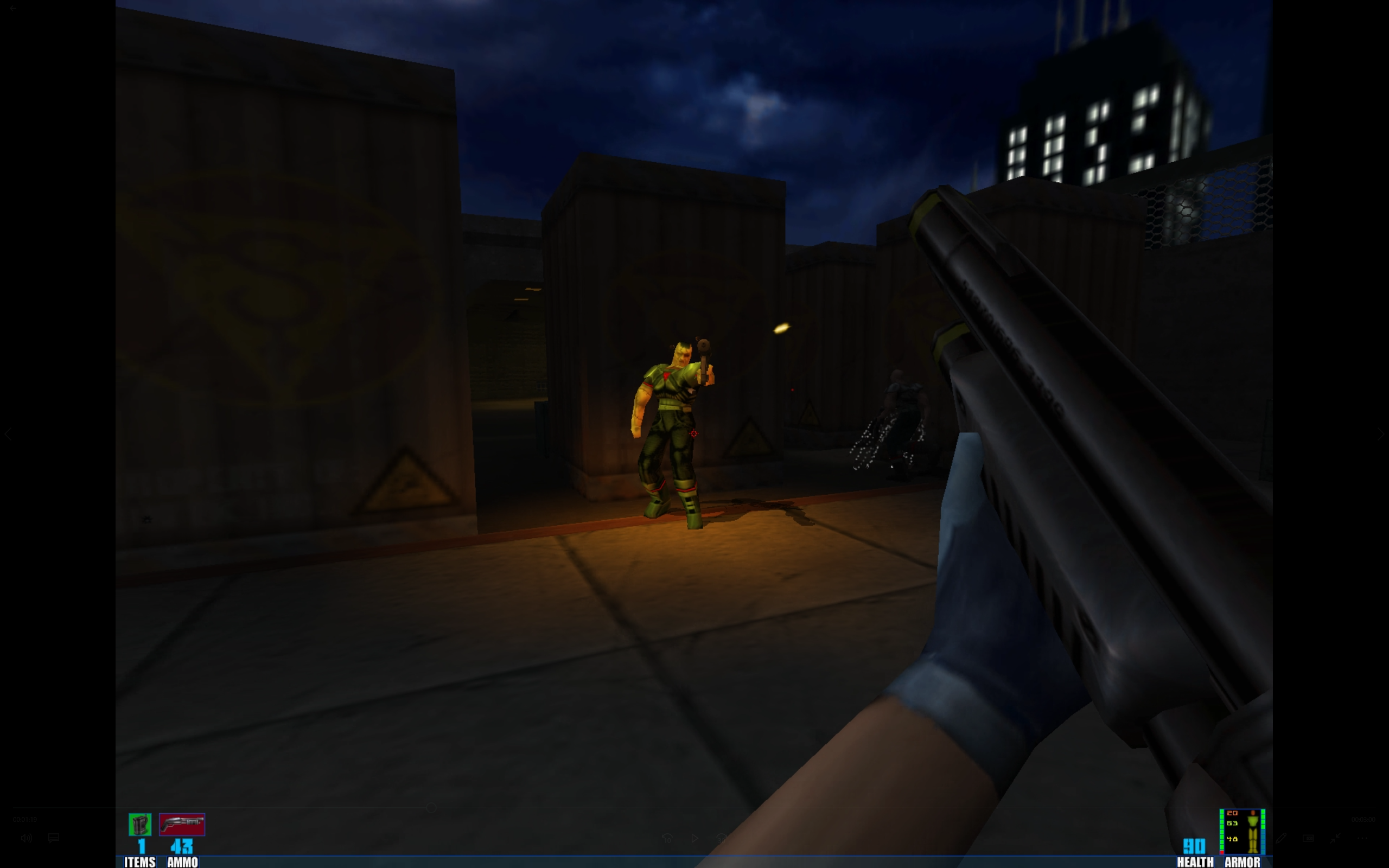Remembering SiN, the last shooter of a world before Half-Life
A story destined to be forgotten in Gordon Freeman’s wake.

This article first appeared in PC Gamer magazine issue 365 in January 2022, as part of our 'Reinstall' series. Every month we load up a beloved classic—and find out whether it holds up to our modern gaming sensibilities.
On November 19, 1998, Sierra released Half-Life. In the time it took to install 300MB of exquisitely poised shooter off its CD-ROM, everything from the genre prior became part of a bygone era. And perhaps the unluckiest of the lot was Ritual’s SiN, which released just ten days before it.
Here was a game that, like Half-Life, wanted to bring a bit more storytelling back to the genre after a long period of dominance from dialogue-averse id Software and similarly laconic newcomers Epic Games. It had a spectacularly named hero in John Blade, and in its antagonist Elexis Sinclaire a typically salacious depiction of a woman – though to give Ritual some credit, both black player-characters and female CEOs were wildly progressive ideas for the era. It had voice actors.
It was set in a recognisable near-future. There wasn’t an inverted cross, alien landscape, or power-up in sight. If John Romero wasn’t already turning in the grave he was slowly digging for himself at Ion Storm, the posters on SiN’s walls hilariously stating ‘Lex to make Romero her bitch’ on them would have sealed it.
Though it was destined to be forgotten in Gordon Freeman’s wake, the story goes like this: billionaire biotech company owner and apparent PVC fetishist Elexis Sinclaire is making dangerous drugs that mutate humans into giant veiny hitboxes down in the Sintek labs. Freeport City PD’s finest and most implausibly musclebound colonel John R Blade gets wind of the scheme when his Hardcorps team is called into a bank robbery led by a mob boss who abruptly erupts into something beastly and inhuman mid-chase. Blade, with hacker sidekick JC in his earpiece and splicing into various mainframes from back at headquarters, must track down the supply of the street drug U-4 causing the mutations and take down Sintek.
Not one for the Booker shortlist, but SiN’s great appeal was, and remains, the sheer exuberance with which it goes about telling that tale. It’s a game full of moments that clearly, transparently began with someone at Ritual saying, “It’d be cool if…” Design document be damned. Market research can do one. What can this new toy of 3D interactive space do?

It can drop you from a helicopter into a bank heist in progress. It can turn a construction site shootout into a platforming puzzle, and then throw a driveable digger in there purely to allow the player to bash a hole in the wall in real-time, then get out, and never operate another vehicle again. What was a bombastic corridor shooter in a subway station five minutes ago becomes a stealth game that asks you to sneak around the Sintek labs with nothing but judicious use of the crouch button to mask your presence.
Creeping Death
That stealth section, just five missions into the story, proved an impasse for me at the time of SiN’s release. It’s tricky to shuffle around the many nigh-identical rooms of the laboratory and tick off the mission objectives without a single NPC, guard or camera spotting me now.
Keep up to date with the most important stories and the best deals, as picked by the PC Gamer team.
To 13-year-old hands in ’98, it was unassailable. It would be months before I’d get to see its later levels. Months spent in the uncaring vision cones of Sintech’s spider robots and wall-mounted miniguns. The indignity of Mr Blade himself sliced and diced by high-calibre rounds. Modern sentiment towards such a hurdle at the hands of clumsy stealth mechanics would be damning, but you didn’t excommunicate a game for trying something in the beige age.
Besides, I’d previously spent several days stuck on a construction site puzzle that required you to look up and shoot a girder out of the sky in order to rupture a water pipe at your feet, allowing Blade to swim out of the hole he was in. And another few days fi guring out a platforming run behind some loose bricks and ascending the fl oors of a derelict building in the precious few seconds before a bomb went off. What was another few weeks reloading the same quicksave?
Sinclair Spectrum

After clearing the stealth mission though, SiN’s digressions from the corridor shooting vogue of the time are fewer. Levels within Sinclair’s wicked facility can come and go with little imprint on the memory.
There’s a sense that after the freewheeling nature of its opening levels, any further conversations that began, “It’d be cool if…” ended with, “Yeah, but we ship in two months.” Laboratories give way to warehouses and sewage works that might be visiting from any number of other shooters from that period, before SiN seems to remember itself again and start flinging absurdly and hilariously disparate locations at you. Oil rigs. Jungle. The ocean floor. All perfectly reasonable places for a policeman to visit in pursuit of an evil biotech boss.
While the cohesion of its levels ebbs and flows in the moment, Ritual’s commitment to interactive toys is a constant. Computer consoles are a particular highlight, offering the odd moment of proto-immersive sim problem-solving. Then and now, the kick of disabling a whole area’s cameras or turrets from within a security room hits beautifully.
You might even pad Blade’s bank balance out by transferring funds from any number of Freeport City Bank’s customers, including one Billge Yeates and Elexis Sinclaire herself. Evidently nobody told her about company accounts. Twenty-three years later it’s still unclear what the advantage is of doing this, or why Ritual saw fit to include it in the game. Like so many of SiN’s extraneous touches, I’m glad they did.
Most lavish of all is the training facility, a lovingly constructed tutorial area that many players would wilfully breeze past on the way to a new game, or fail to spot on the main menu screen. Anyone who does would miss out on the skeet shooting and sniping ranges, the shooting galleries where cardboard terrorists and civilians pop up, and the inconspicuous buttons on the wall that deploy bleachers from the wall, as if all of John’s buddies are about to down tools and watch his mastery. Before you even get on the helicopter to that bank, you’re sold on the future-cop fantasy.
Blade Runner

Before you install the game, in fact. SiN’s manual sets the scene before disc ever meets disc tray, detailing Blade’s troubled dreams and disturbed visions in diary form. A life on the beat, it appears, has taken its toll on the man’s psyche, and the appearance of a new street drug that makes monsters of people has done nothing to take the load off.
He’s quite a talented sketch artist too, is John. The nightmare visions he puts into form, all bulging eyes and blood vessels, are expertly drawn, if partially obscured by the manual’s faux coffee rings.
Quite why Elexis Sinclaire wants to make monsters of people, all bulging eyes and blood vessels, is a question SiN barely scratches. She’s evil. She’s super-rich. Her eyebrows arch at an especially cruel angle. That’s all the insight as we get into the chief antagonist, which is as much of a shame as the asphyxiating latex she’s almost always wearing. As if a buttoned up blouse and pantsuit would have been the difference between playing it and leaving it on the shelf.
Blade and JC fare much better under deeper character scrutiny. In keeping the cocksure young hacker away from the action and thus safe to chip in frequent jibes at his enormous boss, SiN finds a way to bring in some buddy cop comedy and make it the game’s own.
Having JC there to observe the extraordinary events you’re shooting through and then banter with you elevates the story beyond its prosaic plotting. Without a spiky haired white hat watching, Blade would get away with donning a lab tech’s yellow overalls to disguise himself without ridicule. And that would be infinitely duller. As a helpful objective reminder and mechanic explainer, he’s there to address the player as much as the protagonist, but in the end it’s JC’s warm and insouciant bro-ing out with Blade that stands as one of the game’s more enduring components.
Age of Innocence
It’s natural to feel nostalgic for this halcyon period of PC gaming, particularly since it’s been so adept at archiving and updating itself over the years – Night Dive just released a Gold version to Steam featuring the Wages of SiN expansion, and plans a full remaster soon. But the exact nature of what was so good about those days anyway can be hard to pinpoint.
Enter a wobbly Quake II engine shooter, all ideas and precious little polish, that serves a handy reminder that a crucial player in the PC gaming golden age was naivety. Ideas, set-pieces, and mechanics thrown in with reckless vigour and scant regard for timelines. Modern game dev is smart and efficient. SiN had fully animated bleachers in the skeet shooting range of its optional police training level.
Not that we lavished praise on this game and its ilk for their generosity at the time, you understand. This extravagance is something you can only get a sense of by playing a game now. No, at the time everybody was much too annoyed by the absurdly long load times – and subsequently bewitched by Half-Life – to appreciate SiN for what it was: the last luddite shooter before the industrial age, happy just to give you a handgun bigger than your entire forearm, a screen full of identical goons, and a driveable JCB you operate for five seconds then park up forever.
Night Dive’s typically sterling work means it’s perfectly preserved for modern systems and, finally, easy to run on widescreen monitors. But Ritual’s plaudits are long overdue for crafting a shooter whose charms and replayability far exceed our estimations in 1998.
Phil 'the face' Iwaniuk used to work in magazines. Now he wanders the earth, stopping passers-by to tell them about PC games he remembers from 1998 until their polite smiles turn cold. He also makes ads. Veteran hardware smasher and game botherer of PC Format, Official PlayStation Magazine, PCGamesN, Guardian, Eurogamer, IGN, VG247, and What Gramophone? He won an award once, but he doesn't like to go on about it.
You can get rid of 'the face' bit if you like.
No -Ed.


